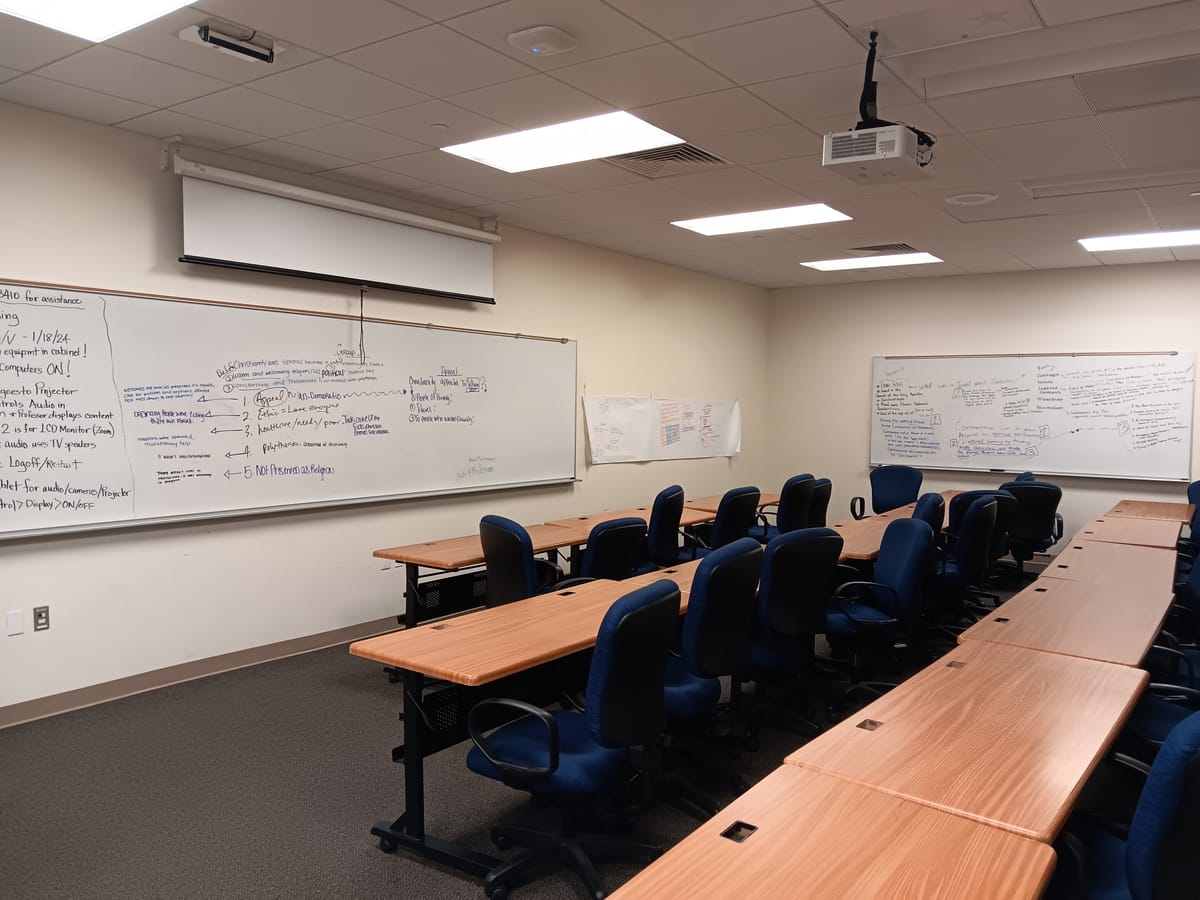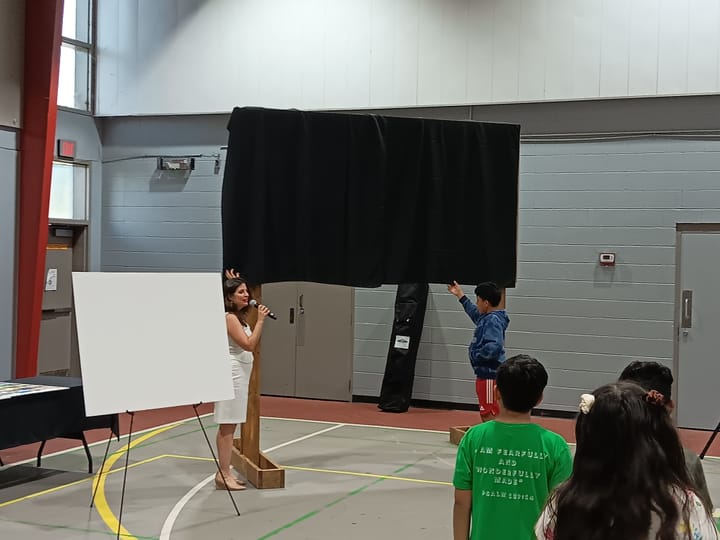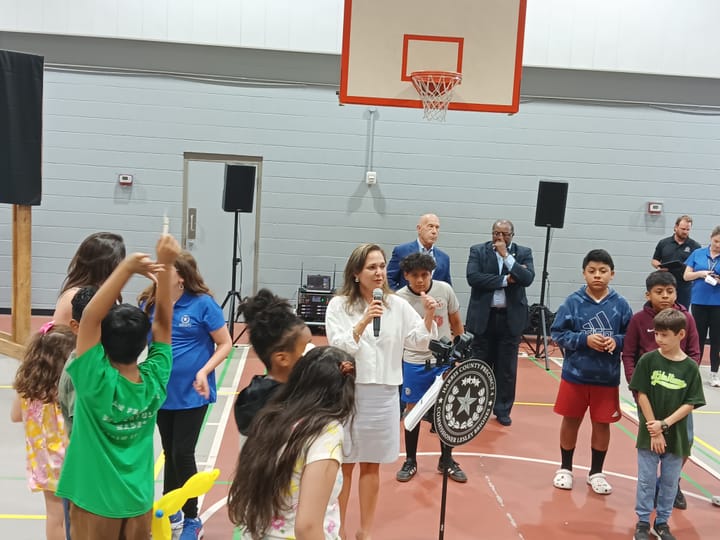How Houston Christian University Professors Are Adapting to Teach Today’s Unprepared Students

“Don’t write a story with pink,” quips Dr. Randy Wilson.
One of his students, a young woman with black hair, does anyway. It's Tuesday, March 5, and four groups of Wilson’s Western Civilization I students are scribbling facts and ideas with multicolored markers on two whiteboards and two six-foot-long sheets of paper.
In round glasses, a close-cropped grey goatee, and a red-and-black bowtie, Wilson ambles up and down the rows of blue-cushioned chairs, peppering students with advice and dry humor: “Remember, you’re trying to explain it to your fifth-grade cousin”; “Is anyone over here on speaking terms with anybody?”
He approaches the center student in one group. “If you can get these two to talk to you, you can put it on your resume.” The sociology professor’s wide eyes make his signature deadpan appear almost sincere.
He ambles to the back corner and watches the students for a couple of minutes. Today, they’re reviewing for one of five exams—and they’re doing the heavy lifting. During the class, Wilson answers their questions and offers guidance, but spends zero minutes lecturing from behind a podium.
On a typical class day, he’d lecture more, but not much, he says. “You don’t want to talk for more than 12-15 minutes because humans can’t listen that long.”
He believes students learn more from talking to each other, so he regularly splits them into small groups and asks them to create their own answers to big questions based on the course material.
“This is what I do nowadays since I started studying metacognitive learning,” he says. (That was back in 2019.)
Metacognitive learning—the study of how we think, promoted in books like Teach Yourself How to Learn—has been growing in popularity as professors look for ways to meet the needs of today’s students, who are often unprepared for higher education.
Nowadays, students often enter college with significant gaps in their reading, writing, and math skills, their historical knowledge, and more, according to nine Houston Christian University professors. Other challenges include students’ busier schedules—many work full-time jobs in college—and their lack of motivation: only fourteen of Wilson’s twenty-five students showed up to the review session.
Wilson’s class is not an outlier. Poor student attendance is common in general education classes at HCU. Nor is HCU an outlier. Universities across the nation have been grappling with all of the above problems.
That’s why Wilson and other HCU professors have been adapting their teaching strategies to reach today’s students. Some of these strategies are “old-fashioned,” others are more innovative. But all show a desire to meet students where they are without “dumbing down” their education.
Teaching How to Learn
Instead of just teaching and expecting students to learn, many HCU professors are teaching students how to learn (metacognitive learning).
Dr. Wilson gives his students a handout that outlines learning strategies for his class like active reading, strategic note-taking, teamwork, discussion, and more.
Dr. John Tyler teaches his law students the study method that helped his grades “skyrocket” when he was struggling in law school: every day after class, he would go through his class notes and write down the five most important things. After the next class, he would write down the five most important things from that day and review the most important things from previous days—and so on.
Various professors have various methods, but HCU requires them to teach some form of metacognition in many freshman classes, especially English.
HCU’s Freshman Year Seminar, a class designed to teach essential college skills, requires students to read Teach Yourself How to Learn. Biology major David Phillips said the book helped him. It may help other students too—if they actually read it.
Helping Students Read Well—and Getting Them to Read in the First Place
HCU’s Dr. Marian Zaki, computer science professor, says that her students tend to search for programming know-how on forums and other online sources. But the computer science information on the internet is mostly unstructured and “80% incorrect,” she says.
She thinks the best way to learn computer programming is still through a good old-fashioned textbook, so she encourages her students to buy $25 copies of a Python programming guide on Amazon. Those who take her advice have shown a “huge improvement curve,” and “they’re loving it.”
But the tough part is convincing the rest of her students. Many choose not to read textbooks (or assignment directions).
Wilson experiences the same problem. He thinks that students skip assigned texts because they don’t know how to “read for understanding." So he teaches them to do “active reading”—reading with a purpose.
He gives them a test question and asks them to "go to the chapter and find a big answer.” Today, his students are working on the questions "What was so great about Constantine?" and “How did Christianity spread [in the Roman empire]?”
He’s not looking for one right answer—rather, he wants his students to show off their learning by using as many details as possible to craft thoughtful answers to the questions.
But that doesn’t mean all his students are reading assigned chapters. So Wilson has started using another old-fashioned strategy: the reading quiz. To keep students accountable, he quizzes them on things they’re supposed to be learning from assigned texts. It’s a fairly common practice at HCU.
But nine weeks into the semester, many students are still skipping readings, he says. “They haven’t come to Jesus yet.”
Helping Students Write
He hesitated initially, but Dr. Louis Markos, a 33-year veteran of HCU’s English department, has changed the way he teaches writing. He felt it was necessary to reach today’s students.
His essay prompts now explain his expectations in much more detail since students come in with fewer writing skills. His prompts also include a personal element to capture students’ interest and make it harder to plagiarize. For example, when his students read the Iliad, he asks them to write a character analysis about the strengths and weaknesses of Achilles or Hector, but also to “look at their own strengths and weaknesses” alongside the heroes, he told the Sharpener.
Markos also thinks this helps him evaluate his students more “holistically”: “Sometimes their analysis of…say, Achilles, might be a little weak, [but] sometimes their analysis of themselves is very mature.”
Dr. Doni Wilson (yes, another Wilson) used to assign a big exam at the end of her sophomore literature class. Now, instead, she tells students to write a series of shorter essays throughout the semester, responding to each part of the novel Crime and Punishment.
She says that it’s easier for today’s busy students—it helps them practice their writing skills consistently and engage with the book “incrementally” rather than all at once.
This spring, she’s also leading four free writing workshops open to all students of the university. They’re for the "Piece of the Past" essay contest, a university-wide attempt to encourage students to write more—and learn about history at the same time.
Filling in Missing History
Dr. John Tyler, law professor, has started requiring students to memorize famous quotations from influential past thinkers, like John Locke, for every exam. He finishes most class periods with a story—often from history—that he ends on a cliffhanger and doesn’t finish until the next class.
“History and philosophy are just as important as law…. Law incorporates our entire history,” says Tyler.
Even when Markos teaches ancient and medieval literature, the English professor lectures about Greek, Roman, and Italian history so his students understand the background of books like Homer’s Odyssey and Dante’s Inferno.
But Dr. David Davis, history professor, says that students’ small background knowledge can have a bright side: he gets to introduce them to thinkers like Homer, Aristotle, and Aquinas for the first time. Less prepared students actually have a “greater opportunity for discovery.”
He sees his main job as “nurturing seeds of curiosity”: “My primary goal is to get them interested in one thing that we discussed, read about, or studied.”
Helping Students Catch up on Math
Math professor John Cowen says, “I resolved to be available for any question about old stuff—like 3rd grade, 4th grade, 5th grade—and made it very clear from the beginning of the year that that’s what I’m for.”
“My GroupMe goes off all day long,” he says. When he answers a student’s question in the group chat, the others get to see it. Most of the time, they’re asking 6th- or 7th-grade questions—like “I don’t know how to find a common denominator”—not precalculus questions.
To make up for gaps in students’ prior education, he also uses a “water hose method”: giving students as much material as possible so they can study what they need. He publishes lecture videos, lecture notes, and practice problems online.
He’s seen good results so far. Last year, he says, two of his classes scored ten points above other class sections that took the same test—even though his higher-performing students should have been placed in a lower-level class based on their pre-semester test scores.
Allies, Not Enemies
The bottom line? Teaching unprepared students can be frustrating, but more than one professor mentioned that it’s important for educators to see their students as allies. Says Cowen, “That doesn’t mean you don’t call them to a high standard…but we’re on the same team fighting this thing called knowledge.”
What are today's students missing, and why? Read more below.

Conflict of Interest Statement: Tyess Korsmo is an HCU alumnus and has taught several English and history classes at the university. Dr. Louis Markos and Dr. Doni Wilson are his former professors.





Comments ()